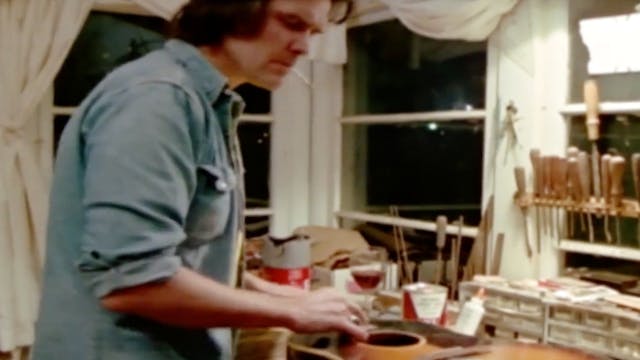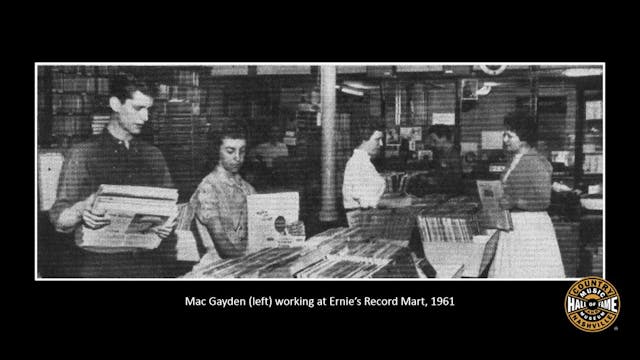Producer Jimmy Bowen • Interview, 2014
Special Programs
•
2h 2m
Jimmy Bowen, an outspoken former recording executive, discusses his long career in Nashville during this two-hour conversation, held at the Country Music Hall of Fame and Museum on April 12, 2014. A producer for Reba McEntire and Hank Williams Jr., he shares his approach to studio work and as an industry leader.
Bowen reflects on his years as bass player and singer for the rockabilly band Buddy Knox & the Rhythm Orchids, which scored a #1 pop hit in 1957 with “Party Doll” (sung by Knox) backed with “I’m Stickin’ with You” (#14), issued under Bowen’s name. “When the girls quit screaming, I could hear myself sing,” Bowen says. “It was pretty obvious I needed to find another way to make a living.”
Bowen then built the foundation for his industry career in the 1960s by producing artists such as Sammy Davis Jr., Dean Martin, and Frank Sinatra. Upon moving to Nashville in 1977, Bowen received an informal education about classic country artists and the city’s music industry from Tompall Glaser. For the next eighteen years, Bowen’s influence as a savvy and often controversial label executive significantly shaped the careers of Garth Brooks, Reba McEntire, George Strait, and Hank Williams Jr., often by simply allowing them to be true to their own creative vision. “With any artist,” he said, “the music is theirs. The musicians’ and the producer’s role is to help support the artist.”
Throughout his time in Nashville, Bowen held top roles at labels including Reprise, MGM, MCA, Elektra/Asylum, Warner Bros., Universal, and Capitol. He led the campaign to increase labels’ budgets for their country music departments, promoted the transformation from analog to digital recording, increased pay for musicians, put women in positions of authority, and advanced the careers of other executives. He also tapped musicians such as Tony Brown and James Stroud for executive posts, which he believed gave the label an edge and artists a strong reason to sign with the labels.
After undergoing surgery for thyroid cancer, Bowen moved to Hawaii in 1995 to recuperate, and largely remained in retirement.
Summing up the lessons of his Nashville years, Bowen says, “First, country music sounds as good as any genre. . . . Second, there is no limit to what country-based singers can do with their art. Tompall Glaser taught me respect for country music and its history. I got to work closely with many great artists, and I played a small part in the career of the most successful country artist of all, Garth Brooks. It was a great ride.”
FOR MORE
Explore the Museum’s public programming: https://countrymusichalloffame.org/plan-your-visit/exhibits-activities/public-programs/
FOLLOW THE MUSEUM
Instagram: https://www.instagram.com/OfficialCMHOF/
Facebook: https://www.facebook.com/countrymusichof/
Twitter: https://twitter.com/countrymusichof
Up Next in Special Programs
-
Remembering Guy Clark • Panel Discuss...
Close friends of songwriter Guy Clark (1941-2015), including his biographer Tamara Saviano, offer insight into his life and career during a panel discussion at the Country Music Hall of Fame and Museum, held January 14, 2017, and hosted by the Museum’s Peter Cooper. Frequent co-writers Shawn Camp...
-
Shake Your Hips: The Excello Records ...
Author Randy Fox explores the history of Nashville blues label Excello Records and its partnership with WLAC-AM and Ernie’s Record Mart in the 1950s. Following a panel discussion, a concert celebrates the label’s soul, gospel, and R&B legacy.
The panelists for this program, held April 6, 201...
-
CMT's Next Women of Country • Panel a...
Brooke Eden, Tara Thompson, Margo Price, Lauren Alaina, and Clare Dunn perform original songs in-the-round and share their songwriting process with CMT’s Leslie Fram during this CMT’s Next Women of Country program, filmed June 10, 2016, at the Country Music Hall of Fame and Museum, during the CMA...



